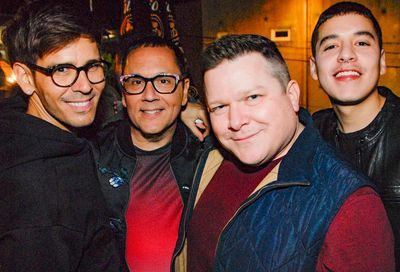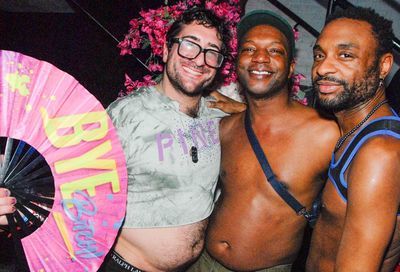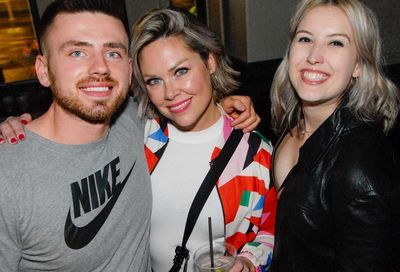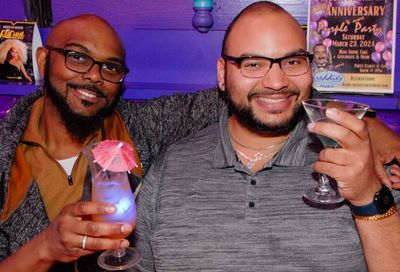Losing Sight of Freedom
Opinion: Town Square
Following the recent celebration of our 30th Capital Pride, it’s worth reflecting how far we’ve come and at what cost. In 1975, ”gay liberation” activists could hardly have imagined the level of social acceptance gays and lesbians have today. Openly gay elected officials, celebrities, and TV characters, as well as state laws protecting civil rights, prosecuting gay-bashing, and establishing civil unions give us reason to celebrate.
The price for these gains, though, has been our freedoms. Sexual freedom — the heart of gay liberation — has been abandoned by the GLBT movement. This has opened the door to recent attacks on the freedom of gays and lesbians to express their sexuality.
For example, undercover officers equipped with night vision goggles prowl Potomac River parks where they entrap men into sexual acts and then arrest them. In the last year, 180 men have been caught in this dragnet.
People around the country are reporting the disappearance of sex toys from checked luggage after screening by Transportation Safety Administration staff. One of the largest retailers of fetish and rubber gear was temporarily blocked from charging credit cards when his bank, one of the country’s largest, decided his business was too sexually oriented.
Owners of adult websites, both gay and straight, have been particularly under attack. Credit card companies routinely suspend their charging privileges without warning or explanation, or they charge them a much higher fee than ”normal” businesses.
In addition, Attorney General Alberto Gonzales has moved to enforce new regulations (18 U.S.C. 2257) that place onerous new requirements on businesses that produce, sell, or show adult videos and images. Although enforcement of these rules has been delayed until a September court hearing, 2257 has already claimed some casualties. The publisher of Bound and Gagged, an institution in the leather community, has announced that the magazine will permanently cease operations. Other adult-oriented businesses have temporarily gone off-line.
You might expect that these assaults on the sexual freedoms of gays and lesbians would spur national GLBT organizations into action. You would be wrong. These recent developments have been met by complete silence.
Thirty years ago, at the first Capital Pride celebration, the engine that drove the national gay and lesbian movement was sexual freedom. Gay and lesbian activists took to the streets, held demonstrations, and marched on Washington fighting for the repeal of sodomy laws, equality of age of consent, and the right to public displays of affection.
Ronald Reagan’s election and the rise of social conservatism forced the leaders of the GLBT movement into a sexual closet and much of the community followed. People now openly admit their gay, lesbian, or bisexual orientation, but they’ve packed their sexuality away in the closet.
Leaders of the GLBT community during the 1990’s reacted by adopting a ”white picket fence” approach. They believed that straight America would grant us equal rights if they could be convinced that gays and lesbians are just like everyone else — hard-working, tax-paying, mortgage-holding, Hilfiger-wearing, family-oriented folks. Most visibly led by the Human Rights Campaign, this strategy pursues an aggressive agenda that includes marriage equality, parental rights, equality in the military, and workplace protections.
Of course, white picket fences also keep people out. Many gays and lesbians — including leatherfolk, drag queens, diesel dykes, and circuit boys — do not aspire to such a life, even when it comes with a gentrified urban loft.
National GLBT organizations sent clear messages to these ”fringe” groups to stay out of sight. Pride parade marshals have been known to scold media photographers who focus their cameras on drag queens or men in chaps. Could it be that such people embarrass the GLBT leadership?
Despite almost two decades of trying to ”normalize” the image of gay folks, states are rapidly making homophobia a part of their constitutions. While our national gay leaders talk about equality, religious conservatives are driving their followers to the ballot box with images of gay men having sex, equating it with bestiality and pedophilia.
Is it shame about sex that prevents national gay and lesbian groups from speaking out when our sexual freedoms are under attack? Are our leaders embarrassed by the open sexuality of leatherfolk and transgenders who would rather paint their fences black or lavender?
Doubtless, many will say advocates of sexual freedom just want to protect queer perverts. But to the religious right, we’re all perverts. The leader of the New York Christian Coalition recently said that gays and lesbians should wear ”warning labels” because we are responsible spreading disease. Perhaps pink triangles would do?
Definitions about what constitutes adult content are expanding to include any portrayal of gays and lesbians, sexual or not — well beyond the old standard prohibitions on full frontal nudity and sex. There also are serious moves by some in Congress to impose network TV’s censorship rules on cable television.
Sexuality is the single issue that unites and defines our community. Fighting for sexual freedom is essential to the struggle for GLBT rights. Straight people know this, no matter how hard our gay and lesbian leaders try to sweep it under the rug. It is naïve to think we will obtain marriage rights when most Americans aren’t even comfortable seeing two men hold hands.
It’s time to take sex out of the closet. Sexual shame imprisoned gays and lesbians throughout the bad, dark 1950s and 1960s until a few transgender sex-workers and their pimping daddies in Greenwich Village decided they’d had enough police harassment. We must fight back against the sex police of the religious right and their co-conspirators, the moralistic vice squads of the GLBT movement. We will no longer accept a movement that sacrifices freedom in the name of equality.
Mindy Chateauvert is an Assistant Professor of African American Studies at the University of Maryland and a long-time advocate of sexual freedom. Larry Barat is a public health physician, the former AIDS Czar of Boston, and a leather activist. Both live in Washington, D.C.
Support Metro Weekly’s Journalism
These are challenging times for news organizations. And yet it’s crucial we stay active and provide vital resources and information to both our local readers and the world. So won’t you please take a moment and consider supporting Metro Weekly with a membership? For as little as $5 a month, you can help ensure Metro Weekly magazine and MetroWeekly.com remain free, viable resources as we provide the best, most diverse, culturally-resonant LGBTQ coverage in both the D.C. region and around the world. Memberships come with exclusive perks and discounts, your own personal digital delivery of each week’s magazine (and an archive), access to our Member's Lounge when it launches this fall, and exclusive members-only items like Metro Weekly Membership Mugs and Tote Bags! Check out all our membership levels here and please join us today!





















